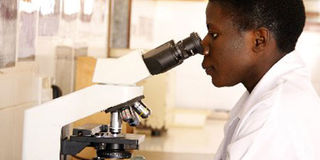Disease up nine-fold amid treatment and testing calls

A health worker conducts laboratory tests. According to the World Health Organization, 400 million people are infected with hepatitis B and C, which is more than 10 times the number of people with HIV. FILE PHOTO
What you need to know:
- The viral disease can also be spread through blood transfusion during surgery as well as injections.
- The acting Director of Medical Services, Dr Jackson Kioko, acknowledged that the disease was on the rise but of more concern was hepatitis A, which is present in faeces of infected people.
The number of hepatitis cases in Kenya has risen nine times in the past 22 years, say researchers, at a time when a UN health agency is urging governments to increase access to testing and treatment.
Mr Joel Tuei, head of a hepatitis laboratory at the Kenya Medical Research Institute, said a surge of hepatitis C has hit the country.
It is a type mostly transmitted through exposure to infected blood.
The viral disease can also be spread through blood transfusion during surgery as well as injections. He attributed the increase of the liver-damaging disease to more drug users who are sharing needles.
“In 1994, there were 40,000 cases but they have now risen to at least 405,000 annually,” he said. In 2011, official data showed Kenya had 18,000 injecting drug users.
According to the World Health Organization, 400 million people are infected with hepatitis B and C, which is more than 10 times the number of people with HIV.
In Kenya, Mr Tuei said, hepatitis B affects at least 13 million people (30 per cent of the population) annually. It is most common in West Pokot and Turkana.
“There is high use of unsterilised razor blades during circumcision and birth delivery in these places and a huge over-reliance on herbal medicine, making it difficult to reduce the cases,” explained the research scientist.
He said that lack of proper nutrition has made people from there “chronic carriers of the virus”.
Speaking to the Nation on phone, the acting Director of Medical Services, Dr Jackson Kioko, acknowledged that the disease was on the rise but of more concern was hepatitis A, which is present in faeces of infected people.
In March, 21 people were admitted in Mombasa following a new outbreak of hepatitis A.
“We have integrated the hepatitis prevention and control in the HIV programmes but there is an urgent need to address issues of sanitation,” said Dr Kioko.





